Savvy Marketing or Debating the Issues: Recent Elections in Latin America by Sujatha Fernandes January 11, 2007
As several more leftist leaders were elected or re-elected during recent elections in Latin America, what kinds of changes have there been in their campaigns? On December 3, radical leftist president Hugo Chávez was reelected in Venezuela with 62 percent of the vote for another six-year term. Both Chávez and opposition candidate Manuel Rosales ran high profile campaigns, with publicized events, inaugurations, and public appearances. But the recent elections also reflected a shift that is taking place across Latin America, from national elections as a savvy marketing event to a forum where real issues can be brought up. Chávez continued to raise the need for regional integration and redistribution as crucial pillars of the Bolivarian project. This use of elections as a forum to put forth an alternative development model to neoliberalism has also been seen in the case of Ecuador, with the election of leftist candidate Rafael Correa.
Over the last few decades, neoliberal policies of privatization, deregulation, and dismantling of the welfare state have been hegemonic in Latin America. The mid-1980s debt crisis and subsequent structural adjustment reforms across Latin America weakened traditional political parties and labor unions. During the 1990s, this void was filled by a new breed of neo-populist politicians such as Bolivia’s Gonzalo Sanchez de Lozada (“Goni”), Venezuela’s Carlos Andrés Pérez, and Argentina’s Carlos Menem, who carried out free-market policies and built ties to Washington. Some of these leaders such as Pérez and Menem hailed from former union-based populist parties such as Democratic Action (Acción Democratica, AD) and the Peronist Party.
(Click here to read more)
skip to main |
skip to sidebar

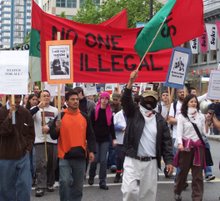

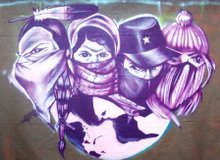
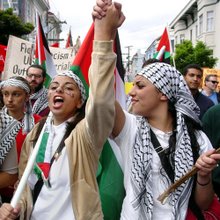
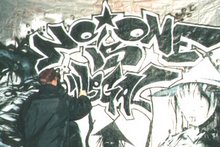
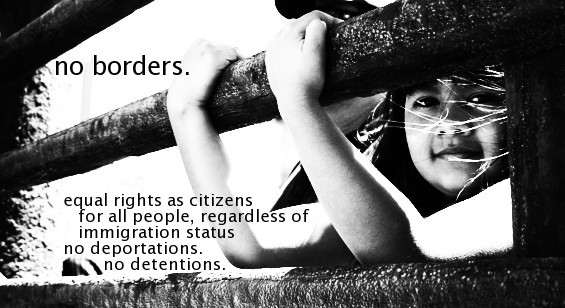
Vancouver - Occupied Coast Salish Territories noii-van@resist.ca / 604-682-3269 ext.7149 www.nooneisillegal.org

Blog Archive
-
▼
2007
(422)
-
▼
January
(139)
- Gitmo North Hunger Strike Update: "We are slowly d...
- Dumas family sues Winnipeg police for wrongful death
- Cottagers forced to leave after land returned to O...
- Quebec town to immigrants: you can't kill women
- CIEPAC denounces harrassment and surveillance
- Ottawa, Six Nations outline positions
- No Border Camp 2007 Zine / Fan-zine de Campamento ...
- Anti-gay, anti-trans Inquisition in the Americas
- The Triquis Inaugurate Their New Autonomous Munici...
- The Flexibilities Of TRIPS and the Indian Left
- Sign to Support: CCIODH Preliminary Conclusions an...
- US: 761 Arrested in Immigration Sweep
- Deportation boats blockaded in Netherlands
- 3.7 Million Iraqi Refugees from US Occupation
- The Iraqi Debacle
- NYC: Scanners for Tracking City Workers
- Amnesty International's Track Record in Haiti
- Jewish Like Me
- Conflict, Disagreement & Oppression on the Left
- Carter and Camp David, where it all began
- Palestinian refugees must have a say-so
- Canada: Hauntings of Colonialism
- AFL-CIO and National Endowment for Democracy
- UK deportations to Iraq/Kurdistan
- US Terror Trials to Allow Hearsay
- The War Becomes More Unholy
- Starving Afghans sell girls of eight as brides
- Open Letter From Concerned Academics
- National Immigrant Solidarity Network Open letter ...
- Bush Blinks on Illegal Spying
- Fighting for the Future of Afghanistan
- Shut Down Guantanamo North and South!
- U.S. Offers Scant Help to Iraqi Refugees
- America’s Slave Labor: Inmates Are Being Forced to...
- The Ciudad Juarez Declaration and the New Wave of ...
- 9,000-year-old Artifacts Found on Occupied Land in...
- U.S. urges 'fivefold expansion' in Alberta oilsand...
- State of Emergency in Bangladesh
- El Salvador's migrants
- Lebanon on the Brink
- 34,000 Iraqi Civilian Deaths In 2006
- Steady March to War on Iran
- Canada: $430M announced for border security
- Demonstration links plight of Palestinians to Nati...
- Colombia: Murder and Migration
- Tyendinaga Update: The Fight for Return of Culbers...
- New Orleans: Letter from St. Bernard Occupation
- Apocalypto: The Cinematic Logic of Genocide
- Bangladeshi President Postpones Election And Impos...
- A current Gitmo detainee speaks
- I Will Not Sign the Darfur Peace Negotiations
- Democracy and Plan Colombia
- Separate and Unequal: The History of Arab Labour
- Bush's Iraq Plan - Goading Iran into War
- Feminist organizations protest attacks on Status o...
- Russia's Racist Crackdown on Immigrants
- Iraq Refugees: Largest Movement Since Palestine 1948
- Anti-torture Conference Denounces U.S., Zionist, T...
- Canadian Prison Guards to Test Stun Guns
- Pittsburgh Organizing Group Shuts Down Recruitment...
- Iraq War and America's Economic Imperialism
- On Zapatista Encuentro
- Aghanistan/Pakistan: Fencing Across The Border
- Roots of US-Made Somalia/Ethiopia War
- Bush 'declaration of war' on Iran
- Iraq Set to Hand Over Oil Reserves to US Energy Gi...
- Protection Racket for Big Pharma
- US Air Strikes on Somalia
- Widening American Rich-Poor Income Gap
- Indigenous Peoples Resist Border Task Force
- Iran: Bloggers Rebel at Censorship
- US Teen Abstinence-Only Crusade
- Recent Elections in Latin America
- Israel: Conditional Citizenship
- Profits of Iraq War Escalation
- Genocide in Gaza, Ethnic Cleansing in the West Bank
- Detainees Release Open Letter from Gitmo North
- Mohawk protest against Deseronto quarry
- New French law enshrining right to housing
- Raids, Reforms, and the Labor Movement
- On the Zapatista Encounter
- Movements in Orissa Face Political Repression
- Guantanamo Bay: A Dark Anniversary
- On Guantanamo Prison Camp's Fifth Birthday, New Pr...
- Open letter by Moroccan, African and European asso...
- Peltier: When the Truth Doesn't Matter
- Black Power, Racism and COINTELPRO: Justice for th...
- Somalia: Making of Another Iraq
- Democrats Criticize Iraq “Surge”,But Won’t Cut War...
- US launches air raids in Somalia
- Make Borders History: Antiracist Perspectives to F...
- Nepal’s gays hit by Maoist clean up drive
- How the West will profit from Iraq's oil
- New York Times pushing War on Iraq
- Inside Gitmo North
- Pakistan: Dissent is Alive
- South America: Toward an alternative future
- Canada in Afghanistan
- Israeli troops raid Nablus
- Demands of the women of Oaxaca
-
▼
January
(139)
Labels
- Afghanistan (21)
- Africa (25)
- Anti-Oppression (15)
- Australia (8)
- Canada (105)
- Corporate Globalization (45)
- East Asia (9)
- Environment and Health (26)
- Europe (25)
- Gender (42)
- GLBTQ (7)
- Haiti (9)
- Immigrant/Refugee/Nonstatus (154)
- Imperialism (51)
- Incarceration (63)
- Indigenous (57)
- Iraq (54)
- Labour (34)
- Latin America (41)
- Media (3)
- Middle East (28)
- Palestine (42)
- Police Brutality (4)
- Poverty (17)
- Racism (58)
- Security (67)
- Somalia (7)
- South Asia (25)
- SPP (2)
- US Abroad (91)
- US Home (160)

About Us
No One is Illegal-Vancouver is a grassroots anti-colonial immigrant/refugee rights community collective with leadership from members of migrant and/or racialized backgrounds.
As a movement for self-determination that challenges the ideology of immigration controls, we are in full confrontation with Canadian border policies; denouncing and taking action to combat racial profiling, detention and deportation, the national security apparatus, law enforcement brutality, and exploitative working conditions of migrants. We stand in solidarity with indigenous struggles against colonization across Turtle Island and also place ourselves within the broader movement for global justice struggling against capitalism, homophobia, occupation, patriarchy, poverty, war, and other systems of oppression and exploitation.





No One Is Illegal - Vancouver
Our educational work involves furthering an anti-imperialist, anti-war, and anticapitalist analysis that links the "War on Terror" abroad to the racist "Fortress North America" at home. We struggle for the right for our communities to maintain their livelihoods and resist war, occupation, and displacement, while building alliances and supporting indigenous sisters and brothers fighting theft of land and displacement.
Our work is carried out through various strategies including public awareness events, direct support work with refugees and undocumented migrants, multilingual community political/legal forums, fighting back through rallies and direct actions, and ongoing campaigns and projects.